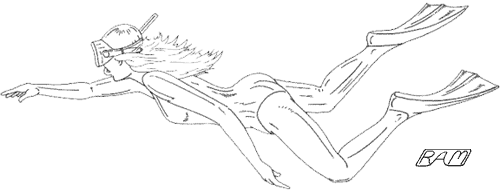Challenges of Sensing in Water
To many people, the ocean is an inhospitable environment. Underwater, our senses are dulled and distorted. This sensory deprivation, combined with an inability to move well through liquid, conspire to make us feel helpless and vulnerable. The aquatic demons we imagine dashing up to drag us to an unspeakably horrible death are far nastier than anything we are likely to encounter. But this rationalization does little to ameliorate our fears.

In the ocean, we are isolated by the limitations of our senses. We are highly visual creatures, relying heavily on this sense to inform us about what is going on in our immediate environment, including to alert us of potential perils. Yet underwater, without a facemask, seawater stings our eyes and our vision is blurry. This alien, fuzzy view is due to the greater density of water relative to air, which causes light to refract (bend) far less. Our eyes change focus by changing the shape of the lens, but the refractive change is too great for our eyes' internal muscles to compensate.
The simple expedience of a diving mask replaces a layer of air over our eyes, so that we can once again focus - only to face new visual distortions. Due to differences in reflectivity and light transmission, the underwater environment is dimly illuminated compared with the glaring sunshine above. In addition, light scatters underwater, resulting in low contrast and severely restricted visual range compared with the familiar world above the surface. Due to its greater refractive index than air, water also seems to magnify objects by about 25%. Yet, in turbid conditions, this effect can reverse for moderately distant objects, making them appear about 25% smaller than they actually are. Seawater also acts as a selective filter, stripping away ever greater portions of the visible spectrum with increasing depth. Warm colors like red and orange are the first to go, while greens and blues persist the longest. If we cut ourselves at depth, our blood billows a disconcertingly vivid shade of green. Even our own blood seems alien here.
Our underwater hearing is distorted, too. Sound travels more efficiently through dense media than through rare (non-dense) ones. In air, sound travels about 1,085 feet (330 metres) per second. But in seawater, sound travels at about 5,085 feet (1,550 metres) per second - nearly five times as fast as in air. Sound travels even faster through the dense bones of the human skull. As a result, we can detect no difference in the timing of sounds arriving at our ears and thus cannot discern the direction from whence it came. Most of us have experienced this at one time or another while swimming in the ocean or a lake: one can clearly hear the whir of an outboard motor, but cannot tell from what direction it originates without raising his or her head from the water and locating the passing boat visually.
In contrast to sound - which travels farther through water than air - underwater, our senses of smell, taste, and touch are severely muted. Although we marvel at the olfactory feats of bloodhounds and other animals, smell is far more important to humans than most of us realize (especially in the recognition of one another as well as such things as baking cookies and burning toast). Yet in seawater, we cannot seem to smell at all, further increasing our isolation from our companions and the marine environment. Likewise, we avoid tasting things underwater, the sharp saltiness of the ocean medium assaulting and overwhelming our sensitive taste buds. If we taste anything at all underwater, it is most likely the painfully dry, stale air fed to us by a scuba regulator. As in so many aspects of modern life, our technology separates us from that which we would join. And lastly, our sense of touch is very much reduced underwater. Not only does water cause our fingertips to prune, thereby reducing pressure sensitivity, but seawater seems to have a local analgesic (pain-muting) effect. Most of us try to avoid pain whenever possible, but we rely on its sharp sting to warn us that we have been injured, so that we might take appropriate action.
Thus, in the marine environment, not only are we unlikely to see trouble coming and - if we see it at all - misjudge its dimensions when it arrives, we often cannot tell whether or how seriously we have been injured. No wonder many people feel helpless and vulnerable in the ocean. Yet the White Shark is perfectly at home in this environment. Armed with senses exquisitely adapted to this dark liquid universe, the Great White is remarkably attuned to every sight, sound, scent, chemical and electrical signal of its marine environment. How the sensory abilities of sharks in general - and Great Whites in particular - compare and contrast with our own is the first step to understanding how they perceive us when we enter their realm. And understanding that is the key to our remaining safe in their company.
